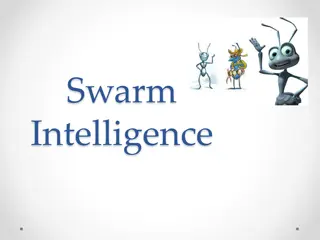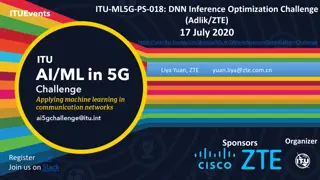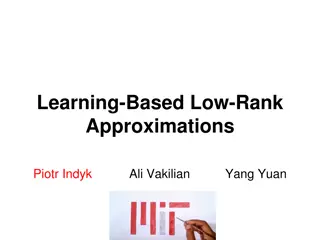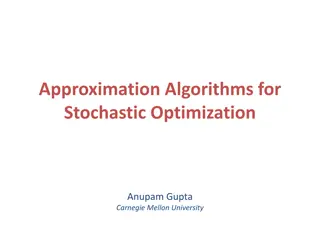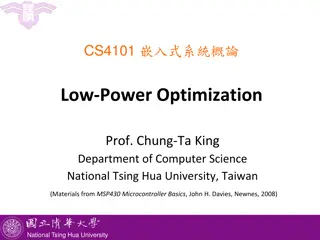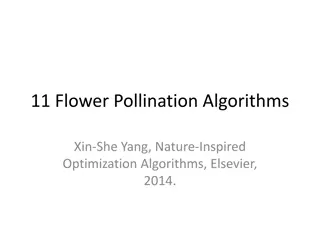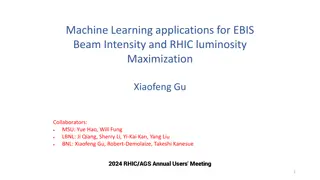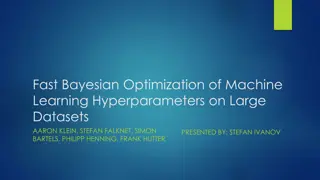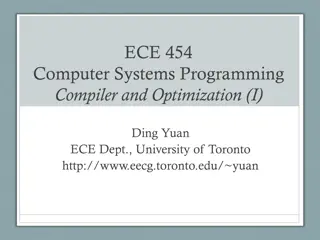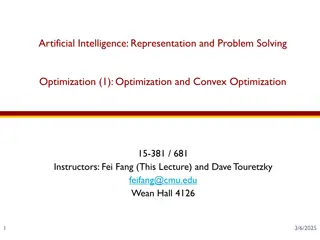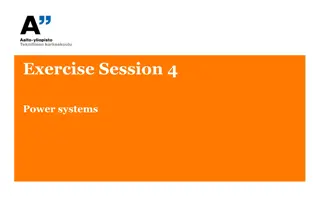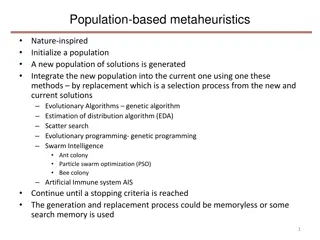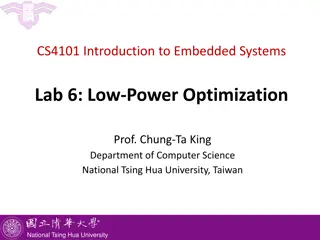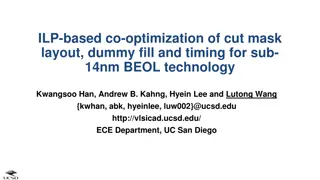Enhancing Query Optimization in Production: A Microsoft Journey
Explore Microsoft's innovative approach to query optimization in production environments, addressing challenges with general-purpose optimization and introducing specialized cloud-based optimizers. Learn about the implementation details, experiments conducted, and the solution proposed. Discover how
7 views • 27 slides
Cisco Systems Fault Managed Power Portfolio Overview
Cisco Systems offers an industry-leading Fault Managed Power (FMP) patent portfolio comprising 24 active assets across seven INPADOC families. The portfolio includes patents supporting fault-managed power systems, PoE deployments, DC power distribution, DC-DC conversion, and HVDC connectors. The FMP
13 views • 4 slides
Swarm Intelligence: Concepts and Applications
Swarm Intelligence (SI) is an artificial intelligence technique inspired by collective behavior in nature, where decentralized agents interact to achieve goals. Swarms are loosely structured groups of interacting agents that exhibit collective behavior. Examples include ant colonies, flocking birds,
7 views • 88 slides
DNN Inference Optimization Challenge Overview
The DNN Inference Optimization Challenge, organized by Liya Yuan from ZTE, focuses on optimizing deep neural network (DNN) models for efficient inference on-device, at the edge, and in the cloud. The challenge addresses the need for high accuracy while minimizing data center consumption and inferenc
7 views • 13 slides
Academic Senate Resolutions and Low-Cost Thresholds in Higher Education
The Academic Senate addresses the adoption of open educational resources (OER) and low-cost materials to support academic freedom and compliance with legislative requirements. The resolution discusses the definition of low-cost resources and the variability among California Community Colleges in set
10 views • 9 slides
Discrete Optimization in Mathematical Modeling
Discrete Optimization is a field of applied mathematics that uses techniques from combinatorics, graph theory, linear programming, and algorithms to solve optimization problems over discrete structures. This involves creating mathematical models, defining objective functions, decision variables, and
4 views • 12 slides
Generalization of Empirical Risk Minimization in Stochastic Convex Optimization by Vitaly Feldman
This study delves into the generalization of Empirical Risk Minimization (ERM) in stochastic convex optimization, focusing on minimizing true objective functions while considering generalization errors. It explores the application of ERM in machine learning and statistics, particularly in supervised
6 views • 11 slides
IEEE 802.11-15/1064r0 Long Range, Low Power Design Criteria Study
Submission on design criteria for Long Range, Low Power (LRLP) in WLAN systems aiming to enhance transmission reliability and range while ensuring compatibility with existing WLAN networks. The key technical components include ultra-low power consumption, communication range extension, and coexisten
1 views • 8 slides
Insights into Recent Progress on Sampling Problems in Convex Optimization
Recent research highlights advancements in solving sampling problems in convex optimization, exemplified by works by Yin Tat Lee and Santosh Vempala. The complexity of convex problems, such as the Minimum Cost Flow Problem and Submodular Minimization, are being unraveled through innovative formulas
9 views • 47 slides
Learning-Based Low-Rank Approximations and Linear Sketches
Exploring learning-based low-rank approximations and linear sketches in matrices, including techniques like dimensionality reduction, regression, and streaming algorithms. Discusses the use of random matrices, sparse matrices, and the concept of low-rank approximation through singular value decompos
3 views • 13 slides
Approximation Algorithms for Stochastic Optimization: An Overview
This piece discusses approximation algorithms for stochastic optimization problems, focusing on modeling uncertainty in inputs, adapting to stochastic predictions, and exploring different optimization themes. It covers topics such as weakening the adversary in online stochastic optimization, two-sta
3 views • 33 slides
Low-Power Optimization in MSP430 Microcontroller at National Tsing Hua University
This material discusses the significance of low-power optimization in modern devices, focusing on the MSP430 microcontroller features for energy efficiency. It covers topics such as energy conservation, power generation, and strategies for reducing power consumption at the device, circuit, and syste
2 views • 23 slides
Leadership and Power Dynamics
Power and leadership are interconnected concepts, with power being the measure of a person's ability to influence others. Leaders have power in various situations, but it does not necessarily mean having power over people. Effective leaders balance their use of power with knowledge and trust, knowin
7 views • 9 slides
Flower Pollination Algorithm: Nature-Inspired Optimization
Real-world design problems often require multi-objective optimization, and the Flower Pollination Algorithm (FPA) developed by Xin-She Yang in 2012 mimics the pollination process of flowering plants to efficiently solve such optimization tasks. FPA has shown promising results in extending to multi-o
2 views • 15 slides
Machine Learning Applications for EBIS Beam Intensity and RHIC Luminosity Maximization
This presentation discusses the application of machine learning for optimizing EBIS beam intensity and RHIC luminosity. It covers topics such as motivation, EBIS beam intensity optimization, luminosity optimization, and outlines the plan and summary of the project. Collaborators from MSU, LBNL, and
5 views • 23 slides
Fast Bayesian Optimization for Machine Learning Hyperparameters on Large Datasets
Fast Bayesian Optimization optimizes hyperparameters for machine learning on large datasets efficiently. It involves black-box optimization using Gaussian Processes and acquisition functions. Regular Bayesian Optimization faces challenges with large datasets, but FABOLAS introduces an innovative app
5 views • 12 slides
Low power listening mode for clients
This document explores the implementation of a low power listening mode for clients in IEEE 802.11-24 networks. The mode aims to reduce power consumption significantly by introducing a 20MHz low power listening chain. Various aspects such as power consumption reduction, introduction of initial contr
3 views • 10 slides
ECE 454 Computer Systems Programming & Optimization
Explore the world of computer systems programming and optimization with ECE 454 at the University of Toronto. Dive into compiler basics, manual optimization, advanced techniques, and more through a comprehensive overview of compiler history. From programmer-machine instructions to high-level languag
11 views • 27 slides
Follow-Up on Low-Power Listening Mode - Summary of Power Consumption Data
This document provides a follow-up on the low-power listening mode with additional data to address previous questions. It includes power consumption details of the connectivity module in smartphones, highlighting the significant impact of Wi-Fi module power drain. The power consumption order and ene
2 views • 9 slides
Machine learning optimization
Dive into the world of machine learning optimization with a focus on gradient descent, mathematical programming, and constrained optimization. Explore how to minimize functions using gradient descent and Lagrange multipliers, as well as the motivation behind direct optimization methods. Discover the
3 views • 16 slides
Artificial Intelligence: Representation and Problem Solving Optimization
This lecture explores optimization and convex optimization in the field of Artificial Intelligence, covering topics such as defining optimization problems, discrete and continuous variables, feasibility, and different types of optimization objectives. The content delves into the challenges and solut
1 views • 36 slides
Low-Power Optimization in MSP430 Microcontroller
Explore strategies for optimizing low-power operations in the MSP430 microcontroller to enhance energy efficiency and extend battery life. Learn about transistor and circuit-level power consumption, as well as efforts at device, circuit, system, compiler, OS, and application levels to achieve low-po
2 views • 30 slides
Calculating Maximum Active Power Transfer in Power Systems
The content provides a detailed exercise session on power systems, focusing on calculating the maximum active power transferred between busbars and deriving expressions for power transfer in relation to voltage angles. It includes questions, images, power-angle equations, and discussions on reactive
7 views • 17 slides
Optimization Techniques for System Design
Introduction to optimization in system design, focusing on maximizing or minimizing objective functions. Explore types of optimization - unconstrained and constrained, with practical examples. Learn about computational methods for solving optimization problems and discover the implementation of opti
0 views • 12 slides
Power Systems: Sources, Converters, and Loads
A power system consists of power sources, converters, and loads. Power sources provide electric power, converters alter power characteristics, and loads consume power. Different types of power sources, such as bench power supplies and batteries, have specific functions. Loads vary from sensors to mo
6 views • 25 slides
Practical Challenges in Portfolio Optimization
This paper delves into the practical challenges and current trends in portfolio optimization, discussing aspects related to using portfolio optimization in practice and highlighting new methods and developments. The content covers a brief introduction, Mean-Variance Optimization (MVO), extensions of
20 views • 18 slides
Long Range vs Low Power in IEEE 802.11-16 Analysis
This presentation delves into the comparison between long range and low power aspects within the IEEE 802.11-16 standard, focusing on coexistence challenges and proposed solutions. It discusses the requirements of various use cases, emphasizing the need for low power without necessarily demanding lo
4 views • 10 slides
Equality Constrained Optimization Overview
This content delves into Chapter 10 of convex optimization covering equality constrained optimization. It explores various formulations, eliminating equality constraints, dual formulation, KKT conditions, and optimization methods like Newton's method. The formulation examples and theoretical concept
3 views • 23 slides
Nature-Inspired Population-Based Metaheuristics and Optimization Techniques
This comprehensive guide delves into various population-based metaheuristics and nature-inspired optimization techniques such as evolutionary algorithms, swarm intelligence, and artificial immune systems. It covers concepts like genetic algorithms, ant colony optimization, particle swarm optimizatio
5 views • 6 slides
Low-Power Optimization for MSP430 LaunchPad - Lab 6 Overview
Explore low-power optimization techniques for MSP430 LaunchPad in Lab 6 at National Tsing Hua University. Understand the MSP430 low-power modes, controlling mechanisms, and sample code for ADC10. Dive into power-efficient practices with Prof. Chung-Ta King in this informative session.
2 views • 16 slides
Low-Power Wake-Up Receiver (LP-WUR) for IEEE 802.11
Explore the design and operation of a Low-Power Wake-Up Receiver (LP-WUR) developed to address the conflicting goals of low power consumption and low latency for IEEE 802.11, solving the duty-cycle trap and enhancing Internet-of-Things (IoT) use cases. This innovative solution acts as a companion ra
1 views • 18 slides
Discrete Optimization in Graph Theory
Explore the relationship between counting techniques, graph theory, and discrete optimization, with examples illustrating the transition from counting problems to optimization problems. Learn about applying optimization in scheduling and making graph models, as well as the role of graphs in discrete
3 views • 8 slides
IEEE 802.11-24 UHR TxOP Power Save Mechanisms for Low Power STA
Explore the IEEE 802.11-24 document discussing power save mechanisms for low-power STAs, including VHT TxOP Power Save and 802.11ax Intra-PPDU Power Save. Discover how these mechanisms aim to enhance power efficiency by enabling STAs to enter shallow sleep states during low-traffic scenarios.
2 views • 19 slides
Cut Mask Co-Optimization for Advanced BEOL Technology
Explore the ILP-based co-optimization of cut mask layout, dummy fill, and timing for sub-14nm BEOL technology. The proposed approach addresses self-aligned multiple patterning, cut process extension, and the impact of cut mask optimization on wire performance. Learn about related works, motivation,
12 views • 23 slides
Optimization Fundamentals and Applications
Explore the essentials of optimization with this PowerPoint presentation by Peggy Batchelor from Furman University. Learn how to recognize decision-making scenarios suitable for optimization modeling, formulate algebraic and spreadsheet models for linear programming problems, and use Excel's Solver
1 views • 33 slides
IEEE 802.11-24/0284r1 Ultra-Reliable PHY Elements: Low Latency & Low Collision
This document explores the ultra-reliable PHY elements of IEEE 802.11-24/0284r1, focusing on low latency, low collision, and low power medium access. It discusses the goals of the UHR, optimizing building blocks for STAs, addressing medium access efficiency without pre-scheduled agreements, and ensu
2 views • 21 slides
Quantum Adiabatic Optimization vs Quantum Monte Carlo: A Comparative Study
Explore the comparison between Quantum Adiabatic Optimization and Quantum Monte Carlo methods in optimization problems. Learn about the adiabatic algorithm, simulated annealing, possibilities for adiabatic optimization, and more. Discover the potential advantages and challenges in leveraging quantum
2 views • 19 slides
IEEE 802.11-23/1942r0 Inter-PPDU Low Power Listening Scheme
Reducing power consumption in WLAN devices is vital for IEEE 802.11bn networks. This document discusses an Inter-PPDU Low Power Listening (LPL) scheme aimed at efficient power management by minimizing signaling overhead and latency related to changing PHY parameters. The scheme introduces a method f
0 views • 7 slides
Problem Solving and Optimization in Artificial Intelligence
Explore the concepts of optimization and convex optimization in artificial intelligence, covering a variety of topics such as search, satisfiability, combinatorial and continuous optimization, and more. Delve into the definition of optimization problems, feasible regions, optimization objectives, an
1 views • 36 slides
Ultra Low Power Strategies for Selective Wake-Up from Receiver Prospect
Explore ultra-low power strategies for wake-up receivers to achieve power consumptions below 10 W, focusing on a proposed 2-stage protocol for wake-up packet that combines low power capability with high data rate. Learn about selective wake-up of groups in large networks to maintain low latency and
0 views • 15 slides


